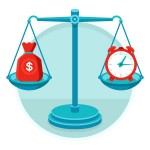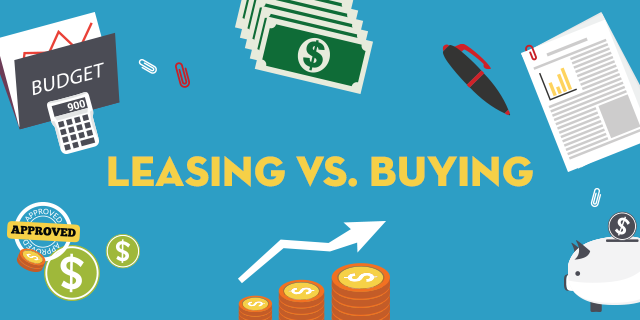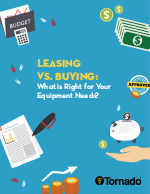Leasing vs. Buying: What is Right for Your Equipment Needs?
Although more than 80 percent of U.S. businesses lease equipment, according to the Small Business Administration, it remains a relatively uncommon practice in the cleaning industry. That means when it comes to choosing between buying or leasing, many facility managers and BSCs feel dazed and confused.
 In short, a lease allows users to make payments to a vendor to borrow a machine for a set length of time. When the contract is up, the user returns the equipment to the leasing firm. It’s a fairly straightforward arrangement, but like most things, there are pros and cons.
In short, a lease allows users to make payments to a vendor to borrow a machine for a set length of time. When the contract is up, the user returns the equipment to the leasing firm. It’s a fairly straightforward arrangement, but like most things, there are pros and cons.
Download Our Free White Paper
To learn more about leases, including the most common programs offered by vendors, download our free white paper.
The Upsides:
- Typically, a lease requires only a small or no down payment. Lease payments come from the operating budget (showing up on the balance sheet as an expense, not a purchase), which preserves working capital.
- The monthly payments on a lease are lower than on a bank loan to buy the same equipment.
- Leasing can protect a business’ credit, allowing it to save its bank-borrowing capacity for other needs or emergencies.
- Equipment is typically leased new, so the borrower gets it during the most trouble-free part of its lifespan.
- Vendors usually offer the same level of support to their leasees as they do to buyers.
- A portion of or all of the leasing fees are tax deductible as an operating expense, In fact, Section 179 of the IRS Tax Code allows for accelerated deductions, which can be a very effective tax strategy.
The Downside of Leasing:
- Paying interest rather than cash (or paying a higher interest rate than on a bank loan) means a lease can be more expensive in the long run.
- The user must commit to keeping the equipment for the entire lease period, regardless of changes in their business.
- If the user chooses to buy the machine at end of the lease period, the total cost will be higher than if they had purchased it from the start.
- The user is typically responsible for some or all of the equipment’s maintenance costs during the lease.
- With no ownership rights, the facility or BSC cannot sell the equipment when finished with it to recoup some of the expense.
 Before deciding whether to lease or buy, first calculate the estimated annual cost of each option. For purchasing, add the price tag and average lifetime maintenance costs, then divide by the expected lifespan of the machine. For leasing, add up a year’s worth of monthly payments (plus any maintenance contracts and down payments, divided by the total length of the lease). Although this isn’t the complete picture, it’s a good snapshot of the difference.
Before deciding whether to lease or buy, first calculate the estimated annual cost of each option. For purchasing, add the price tag and average lifetime maintenance costs, then divide by the expected lifespan of the machine. For leasing, add up a year’s worth of monthly payments (plus any maintenance contracts and down payments, divided by the total length of the lease). Although this isn’t the complete picture, it’s a good snapshot of the difference.
The primary reason businesses lease is to get access to expensive machines they otherwise couldn’t afford.
A BSC wanting to grow its business might need several ride-on machines at $5,000 to $15,000 each to land larger accounts. Buying the equipment would likely empty his cash reserves or his devour his credit line, and take many years of increased sales to recoup. A lease, however, could ease the financial burden.
A facility manager at a public school, where budget cuts are the norm, might wait years or even a decade to get funds to replace dilapidated equipment. A lease can allow him to get creative to put new machinery in his staff’s hands.
Leasing may also be a good option for equipment that’s frequently updated. A lease can help a business remain competitive with the most up-to-date equipment for a fixed amount of money each month.
Finally, leasing can help small-business owners and managers maximize budget dollars. A portion of the cash that would have been spent on a new machine (or that was earmarked for a down payment) can instead be invested in other programs, such as marketing program that could pay back tenfold in new business.
Increase Profits & Productivity with Your Equipment
Tornado Industries does more then sell equipment. We help solve facility cleaning challenges. Let’s talk about your cleaning challenges in person.


